Business & the Workforce

SB 1070 “Gets Tough” on Arizona’s Housing Market
With only six weeks until Arizona’s immigration enforcement law goes into effect, area housing analysts are already expecting the worst. According to the Arizona Republic, housing experts anticipate that SB 1070 will not only drive illegal immigrants out of the state, but legal residents and potential new homebuyers with them—“departures from a state where growth is the economic foundation.” The resulting exodus will likely spur more foreclosures and create more vacant homes and apartments, which as real-estate analysts point out, will scare off potential homebuyers who fear lower home values. With a budget deficit of $4.5 billion and an economy struggling to get back on its feet, a declining housing market is the last thing Arizonans need. Read More

New Report on the Benefits of Legalization Comes Up Short
A new report released by the Public Policy Institute of California (PPIC) this week attempts to assess the economic benefits of a legalization program on immigrants and native born workers. The report, Immigrant Legalization: Assessing the Labor Market Effects, however, falls short on research and methodology. While the report accurately concludes that legalization would not have a negative impact on native workers' wages and employment, the report takes a myopic approach to legalization’s impact on wages and mobility of the newly legalized. A wide range of economic studies—studies which consider legalization’s impact in both the long term and in context to comprehensive immigration reform—conclude that legalization does in fact benefit both native-born and immigrants alike. Read More

Immigration and the Future of American Innovation: Does America Need to Pump Up the Volume?
It should come as no surprise to anyone following the global economy that when it comes to innovation and competition, America has lost that loving feeling. Numbers in key areas of innovation—percentage of patents issued, government funded research and venture capitalists' investments—are all down. While some point a finger at a weaker economy, others look to poor domestic policy and increased global competition. Either way, American innovation is slowly fading on the global stage. Read More

Proposed “Start-Up Visa Act” Would Help Create American Jobs
With the passage of the $15 billion jobs bill in the Senate last week, job creation is certainly at the top of the Congressional priority list. As a way to further stimulate the economy, Chairman and Ranking Member of the Senate Foreign Relations Committee, Senators John Kerry (D-MA) and Richard Lugar (R-IN), introduced the Start-Up Visa Act of 2010 last week which incentivizes job creation through the promise of legal residence status—that is, “drives job creation and increases America’s global competiveness by helping immigrant entrepreneurs secure visas to the United States.” Read More

E-Verify Gets It Wrong, Again
Another independent evaluation of the E-Verify program once again confirms what advocates have been saying for years—E-Verify doesn’t work. A new evaluation of the federal employment authorization program—conducted by Westat, a research company, in December 2009—is now available on the E-Verify website. The system only detected unauthorized workers about half of the time. The evaluation found the program couldn't confirm whether the documents workers were presenting were their own. As a result, "many unauthorized workers obtain employment by committing identity fraud that cannot be detected by E-Verify," according to Westat. The "inaccuracy rate for unauthorized workers" is about 54%. Read More

Can Immigrants Give America’s Rust Belt a Tune-Up?
Immigrants have long been a driving economic force in America’s large thriving metropolitan areas—New York, Los Angeles, Chicago, Miami, Dallas—where immigrants’ economic output produces a large and growing share of the U.S. gross domestic product. But what about the once thriving industrial heartland of the United States known as the Rust Belt? In a roundtable discussion yesterday in Akron, Ohio, authors Richard Herman and Robert Smith discussed their new book which points out how “immigrants and the businesses they create” can “provide rundown neighborhoods with a powerful jolt of new investment and spinoff job opportunities” and how our broken immigration system is taking away at least one tool for economic recovery in the cities that need the most help. Read More

How Immigrants Can Help America Rise Again
With the U.S. unemployment rate still hovering around 10 percent, it’s only natural for people to worry whether America’s recent economic decline is reversible. In this month’s issue of Atlantic Monthly, correspondent James Fallow takes a step back to address just that—what he calls "the fear of American declinism." In his historical and economic analysis of America’s overall well-being, Fallow finds that while America’s governing system is old, broken and in desperate need of reform, Americans should find comfort in “America’s cycle of crisis and renewal.” We’ve been here before, Fallow says, and if we want to move forward, we need to maintain and nurture the driving economic forces that have lined the road to renewal in the past—a thriving university system, a culture of innovation and a receptiveness to immigrants. Read More

Risky Business: Our Broken Employment–Based Immigration System Jeopardizes the American Economy
BY CHARLES H. KUCK* Does Congress's continued failure to fix our broken employment-based immigration system jeopardize our economy, now and in the future? Yes, it does. If we don't have enough employment-based immigrant visas, the best and brightest from around the world will start going somewhere else. We are not only a nation of immigrants; we are a nation of successful immigrants. We attract those who are willing to work hard, better themselves, and strive for success. However, our legal immigration system has made the process of immigration to the United States so difficult, so full of uncertainty, and so lengthy, that folks are now choosing not to come. Read More
Make a contribution
Make a direct impact on the lives of immigrants.
